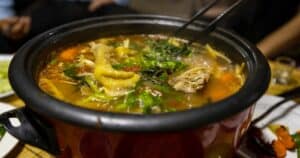You love hot pot. The bubbling broth, the variety of meats and veggies, the communal dining experience. But in the back of your mind, you can’t help but wonder – is sharing a boiling vat of liquid really safe?
You’re not alone in your concerns. Many hot pot fans worry about the health risks of this popular cooking method. After all, numerous people use the same pot and dip their cooking utensils into the shared broth throughout the meal.
The good news is that with proper hygiene and caution, hot pot can be a reasonably safe meal option. The broth is kept at a steaming, germ-killing temperature throughout service. Many hot pot restaurants use separate dividing trays to keep individual orders separate. And you can avoid cross-contamination by using serving chopsticks and not double-dipping cooked food.
While hot pot will never be 100% risk-free, you can take steps to reduce your chances of getting sick. Avoid hot pot joints with lapses in food prep sanitation. Stick to cooking your own raw ingredients. And listen to your body – if you ever feel off after eating hot pot, it may be time to take a break.
With some care and common sense, you can continue to enjoy the flavors and fellowship of hot pot without too much worry. This hearty, healthy meal still deserves a place at the table.
The Health Risks of Hot Pot
Hot pot does pose some health concerns. After all, numerous people use the same pot and dip their cooking utensils into the shared broth throughout the meal. Here are some of the risks:
- Cross-Contamination – Diners using the same cooking pot and broth can lead to the spread of germs and bacteria. Double-dipping cooked food back into the broth amplifies this risk.
- Food Safety – The raw meats, seafood, eggs, and vegetables added to hot pots can spread pathogens if they are contaminated or undercooked.
- Unhygienic Practices – Hot pot restaurants that do not follow proper sanitation and food prep guidelines put customers at a higher risk of getting sick.
- Compromised Immune Systems – People with weakened immune systems, the elderly, pregnant women, and young children face higher risks of foodborne illness.
- Allergens – Ingredients like shellfish, peanuts, and eggs can cause reactions in people with specific food allergies. Cross-contact in hot pots makes this more likely.
So yes, there are definitely some valid concerns over the safety of eating hot pot. However, there are also ways to mitigate these risks.
Tips for Safer Hot Pot Eating
While hot pot will never be completely risk-free, you can take precautions to reduce your chances of getting sick:
Choose Reputable Restaurants
- Only dine at hot pot restaurants with strict food safety practices and good health department scores.
- Avoid joints with lapses in sanitation or ingredient storage.
Focus on Ingredient Safety
- Opt for precooked meats instead of raw to avoid undercooking risks.
- Rinse produce thoroughly before cooking.
- Cook eggs thoroughly before eating.
- Check seafood freshness and cook thoroughly.
Practice Proper Cooking Hygiene
- Use serving chopsticks or spoons, no double-dipping.
- Keep cooked and uncooked items separated.
- Discard broth once it looks murky or has debris.
- Wash hands before and after handling food.
Pay Attention to Health Needs
- Those with compromised immunity or food allergies should take extra care or avoid hot pot.
- Pregnant women should avoid raw meats and seafood.
- Feel sick after eating hot pot? Take a break next time.
Enjoy Hot Pot at Home
- Home hot pot lets you control ingredients and cooking more.
- Stick to cooking your own raw ingredients, avoid unknown communal broths.
- Keep hot pot equipment super clean before and after use.
How Hot Pot Restaurants Can Improve Safety
Hot pot restaurants play a huge role in keeping this cuisine safe for diners. Here are some ways they can enhance sanitation:
- Maintain scrupulous food handling and storage practices.
- Use separate pots and broths for each group.
- Provide serving chopsticks, ladles, and strainers for every diner.
- Remind customers not to double-dip cooked foods.
- Ensure food prep surfaces and equipment are sanitized frequently.
- Source ingredients from reputable, hygienic suppliers.
- Clearly label potential food allergens like shellfish on menus.
- Train staff comprehensively on food safety protocols.
The Verdict on Hot Pot Safety
Given all the risks associated with hot pot, is it still worth eating? For most reasonably healthy people, yes – hot pot can be safe if proper precautions are taken by restaurants and consumers. While not 100% risk-free, the chance of actually getting sick from hot pot in most cases is quite low.
The key is using your best judgment. Stick to reputable hot pot joints with good hygiene practices. Take care when selecting your ingredients. Follow cooking and serving guidelines to avoid contamination. And know when to avoid hot pot if you have a compromised immune system or food sensitivities.
For many fans, the rewards of this interactive dining experience outweigh the risks. Hot pot can still have an honored place at the table as long as hygiene remains a top priority.
The Bottom Line on Hot Pot Safety
Hot pot lovers don’t need to give up this communal, flavorful meal – just take some simple precautions. Choose your restaurant wisely. Focus on ingredient and cooking safety. Listen to your body if you ever feel sick afterwards. With some care and common sense, you can keep enjoying hot pot for years to come.
This ancient cooking tradition still deserves a place in the modern world when done right. So gather your family or friends, prepare your favorite meats, veggies, broths and sauces, and have a safely delicious hot pot experience. Your taste buds will thank you.
FAQs About Hot Pot Safety
Is it safe to eat raw eggs in hot pot?
Raw eggs can carry Salmonella bacteria, so they come with a risk. Safer options include cooking eggs fully before eating, using pasteurized eggs, or avoiding raw egg dips and sauces in hot pot.
What meats are less risky to eat in hot pot?
Opt for precooked meats like cooked shrimp or boiled slices of beef or lamb. Raw meats carry more food safety risks. Also avoid high mercury fish like swordfish in hot pots.
Can you get sick from vegetables cooked in hot pot?
Yes, if the vegetables have contaminants from handling or are cross-contaminated from raw meats in the hot pot. Disinfect vegetables, keep cooked/uncooked food separated, and use serving utensils to reduce risks.
Is hot pot broth reused between customers?
At some restaurants yes, but this is an unsafe practice. Broths should be changed regularly, never recycled between different groups. Insist on fresh broth for the safest experience.
If I don’t feel well after eating hot pot, what should I do?
Seek medical care if you experience vomiting, fever, diarrhea, etc. Save any leftovers for testing. Report the illness to the health department. Avoid hot pot for a few months to allow your body to recover.





